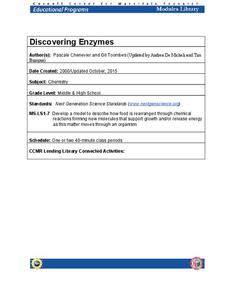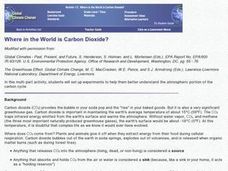Curated OER
Applied Science - Science and Math Lab 4B
Learners experiment with the combination of vinegar and baking soda. In this applied science lesson, future scientists compare qualitative and quantitative data collected from their exploration. Then they work together to analyze and...
Curated OER
Baking Soda vs. Baking Powder
In this chemical reactions instructional activity, students by comparing the chemical reactions of baking soda and baking powder. This instructional activity has a graphic organizer and 7 short answer questions.
American Chemical Society
Production of a Gas - Controlling a Chemical Reaction
Though the publisher designated this unit for use with third through eighth grades, this particular lesson plan would be best used with middle schoolers due to the specific measurement skills required. Basically, they set up the reaction...
American Chemical Society
Change in Temperature - Endothermic Reaction
Now that learners have been exposed to chemical changes, they learn that some take in heat and therefore, decrease in temperature. The same reaction that they have been investigating between baking soda and vinegar is revisited,...
LABScI
Stoichiometry: Baking Soda and Vinegar Reactions
Examine the concept of stoichiometry using common household products. Scholars perform chemical reactions and measure the reactants and products. They compare their measurements to predictions made from the chemical equations.
American Chemical Society
Powder Particulars
By both demonstration and hands-on investigation, physical science fanatics come to know that some materials react when they come together. Adding vinegar to both baking soda and to baking powder, the difference between the two is clear....
American Chemical Society
Change in Temperature - Exothermic Reaction
Alone, or as part of the intended unit on chemical reactions, this activity allows learners to experience an exothermic reaction. Here, learners add calcium chloride to a baking soda solution and watch the temperature rise! They will...
Columbus City Schools
ABC: Acid Base Chemistry
Bubble, bubble, boil and trouble! What causes common substances like baking soda and vinegar to react the way they do? Welcome your junior chemists to the wonders of acid-base chemistry using a comprehensive and fun...
Curated OER
The Influence of Carbon Dioxide on the Chemistry of Soda
Students investigate the carbon dioxide content of different sodas. In this chemistry lesson, students explain why PET containers are preferable than HDPE for soda bottles. They collect data and graph them.
Earth Day Network
Staying Green While Being Clean
Clean up the environment with a activity that focuses on replacing hazardous cleaning supplies with green, environmentally-friendly products. Using a dirty patch of surface as a control area, kids clean other parts of various...
Curated OER
Applied Science - Physics Post-Lab
Students investigate energy. In this Physics lesson, students explore different sources of energy: heat, nuclear, and chemical. Students sing an electricity song.
Cornell University
Discovering Enzymes
Explore the function of enzymes through a series of lab investigations. Learners use household enzymes such as hydrogen peroxide to model the role of enzymes. The enzymes break down proteins with and without a catalyst.
Curated OER
Volcanoes: Second Grade Lesson Plans and Activities
Young geologists explore volcanoes with a series of engaging geology activities. First, they learn the difference between magma and lava before coloring and labeling the parts of a volcano. During the lab, individuals watch a...
American Chemical Society
Using Chemical Change to Identify an Unknown
If you have taught the first instructional activity in this mini unit, learners already know that cabbage juice and vinegar cause chemical changes in some materials. Now, they get a chance to use them to compare the liquids' reactions to...
Curated OER
Milk Glue
Learners observe a precipitation and neutralization reaction and learn to filter the products of the precipitation reaction. In this precipitation and neutralization lesson plan, students create curds and whey using milk and vinegar....
Curated OER
Chemical Change
Fifth graders watch a demonstration in which a balloon is inflated using the gas created by combining vinegar and baking soda. Then, in groups, they combine various assigned substances and watch and record the results.
Curated OER
Fun With Chemical Changes
Looking for a terrific chemistry lesson for your 5th graders? This one could be for you! After a teacher-led demonstration, learners are broken up into groups and perform an experiment using cabbage juice, water, window cleaner, and...
Curated OER
Where in the World is Carbon Dixoide?
Students conduct experiments designed to detect the presence of CO2 by using a BTB that changes color (blue to yellow) in the presence of CO2. First, students experiment with the CO2 from combining vinegar and baking soda. In part two,...
Curated OER
Greenhouse Gases
Although the worksheet for the lab activity is not included, this is an activating activity for your class to do when learning about the greenhouse effect. They lay three thermometers underneath a lamp: one out in the open, one under a...
Curated OER
Carbon Dioxide - Sources and Sinks
Where does all of the carbon dioxide come from that is supposedly leading to climate change? Earth science pupils test animal, plant, and fossil fuels as sources in this investigation. Using an indicator, BTB, they are able to detect the...
Curated OER
The Scientific Method, Blood Typing, and Antibiotic Resistance
Students are given some components of an experiment, where they are able to identify and fill in missing parts, such as hypothesis, conclusion, results, etc. They form a hypothesis given general scientific facts. Students apply the...
Curated OER
Relationships and Biodiversity Lab
In this relationships and biodiversity activity, high schoolers investigate the relationships between 4 plants sample using 7 different tests. These include looking at structural characteristics of the plants, seeds and stems, using...
Curated OER
It is a Crash Test, Dummy
Students research air bags on the Internet and use the information to design their own version of an air bag. After exploring the benefits and dangers of air bags students perform a chemistry lab in which they mix baking soda and vinegar...
Curated OER
Milk Glue
Students create glue from milk by curdling milk with an acid. In this protein denaturing lesson plan, students experiment with milk and vinegar to denature the proteins in milk, create curds and whey and use the curds to produce glue by...

























